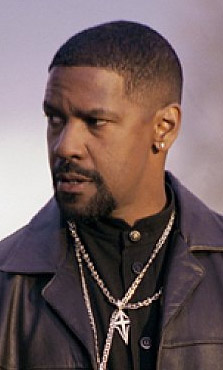
“Training Day” begins life as a made to order morality play and ends as a typical mano à mano gunfight thriller, complete with a rooftop chase and the obligatory scene in which the villain exhorts the hero to shoot him, knowing he doesn’t have the guts, and one of the movie’s two major strengths is its shrewd transition from one to the other. By the time Alonzo’s homilies on the hard truths of being a street hustler with a badge are replaced by the classic ticking time-bomb third act, the stylish drama had me so engrossed I hardly noticed that the Social Significance had been trap-doored off the stage.
Wisely shying away from comparisons to crooked cop yarns of the past, such as “Serpico”, “L.A. Confidential”, or even “Dirty Harry” (whose ending it tries unsuccessfully to evoke), “Training Day” has the good sense to give up its meditation on justice right around the moment Jake rides in the back of an MTA bus across town, loading his .9mm Beretta in plain sight, complete with a weary but determined facial expression on loan from the Schwarzenegger canon; say, “Raw Deal”, or “Commando”. But if the film shies away from examining the issues it raises, at least it packs a heady punch to make us forget that our investment in the hero’s moral dilemma never pays off.
The amnesia is courtesy of the film’s other major strength, Denzel Washington in the Mephistopheles role as Lieutenant Alonzo Harris. Had Denzel not given the character the necessary slickness, bombast, and goatee, “Training Day”‘s illogical leaps from scene to scene would have been jarring. Instead, the force of his performance glues everything together into a messy but effective edifice. Only an actor with Washington’s gifts could effortlessly conjure such nasty venality and then-believably-talk his way into grace. “This is chess, not checkers”, he tells Jake, and there is a saving sense of real intelligence behind his moves that redeems the story’s often adventitious plot twists.
For instance, the entire ending, in which a neighborhood turns its back on Alonzo, is set up by a single line of dialogue muttered by a tertiary character, and not very convincingly at that. Or Jake’s escape from certain death in an East L.A. drug den, which requires a coincidence of “Pulp Fiction” magnitude. Or Jake’s preposterous intake of narcotics early in the movie, or an out-of-the-blue plot involving Russians that is barely explained, or...
You get the idea. Amazingly, Washington keeps his fingers in just about every crack in the dam, and against all odds “Training Day” manages to engage the audience in real suspense. The only truly disappointing element of “Training Day” was the ending, as Alonzo’s punishment is splashed in our laps in a scene reminiscent of the bloody conclusion to “Bonnie and Clyde”, or the hit on Sonny Corleone, but Alonzo’s fate lacks any trace of the residual significance of his predecessors. The flat smack of the film’s precipitously declining level of thoughtfulness hitting rock bottom, Alonzo’s “poetic” comeuppance is a disturbing commentary on either (take your pick) the bloodlust of movie audiences, or the misinformed and highly patronizing attitude movie studios have about said audiences. In a stroke of cowardice— not “dark, edgy” filmmaking— “Training Day” strips Jake of his hard-won victory, for Alonzo, in the final tally, was right on the money: the only justice that matters is street justice, and the movie gives it to us in a flurry of bullets. In the end, we knew who we were supposed to root for, but apparently we didn’t know why. |